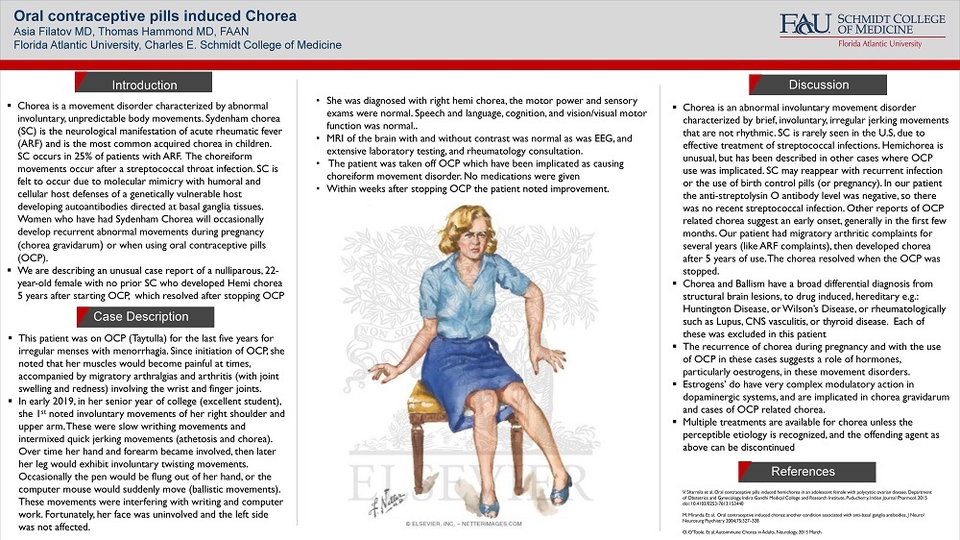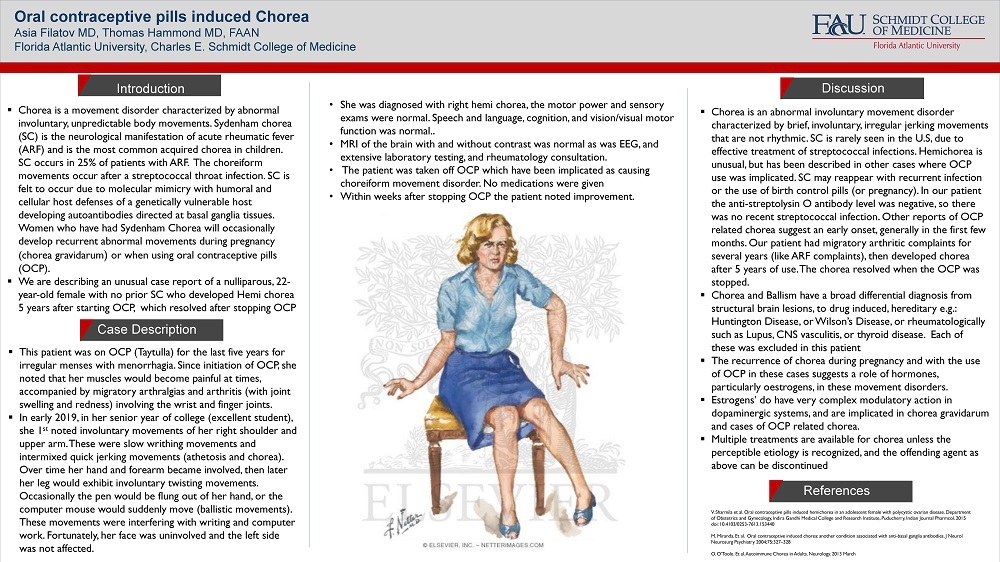Abstract
INTRODUCTION
Chorea is a movement disorder characterized by abnormal involuntary, unpredictable body movements. Sydenham chorea (SC) is the neurological manifestation of acute rheumatic fever (ARF) and is the most common acquired chorea in children. SC occurs in 25% of patients with ARF. The choreiform movements occur after a streptococcal throat infection. SC is felt to occur due to molecular mimicry with humoral and cellular host defenses of a genetically vulnerable host developing auto-antibodies directed at basal ganglia tissues. Women who have had Sydenham Chorea will occasionally develop recurrent abnormal movements during pregnancy (chorea gravidarum) or when using oral contraceptive pills (OCP).
We are describing an unusual case report of a nulliparous, 22-year-old female with no prior SC who developed Hemi chorea 5 years after starting OCP, which resolved after stopping OCP
CASE REPORT
This patient was on OCP (Taytulla) for the last five years for irregular menses with menorrhagia. Since initiation of OCP, she noted that her muscles would become painful at times, accompanied by migratory arthralgias and arthritis (with joint swelling and redness) involving the wrist and finger joints.
In early 2019, in her senior year of college (excellent student), she 1st noted involuntary movements of her right shoulder and upper arm. These were slow writhing movements and intermixed quick jerking movements (athetosis and chorea). Over time her hand and forearm became involved, then later her leg would exhibit involuntary twisting movements. Occasionally the pen would be flung out of her hand, or the computer mouse would suddenly move (ballistic movements). These movements were interfering with writing and computer work. Fortunately, her face was uninvolved and the left side was not affected. She was diagnosed with right hemi chorea, the motor power and sensory exams were normal. Speech and language, cognition, and vision/visual motor function was normal..
The patient was taken off OCP which have been implicated as causing choreiform movement disorder. No medications were given. Within weeks after stopping OCP the patient noted improvement. Other reports of OCP related chorea suggest an early onset, generally in the first few months. Our patient had migratory arthritic complaints for several years (like ARF complaints), then developed chorea after 5 years of use. The chorea resolved when the OCP was stopped.
DISCUSSION
Chorea and Ballism have a broad differential diagnosis from structural brain lesions, to drug induced, hereditary e.g.: Huntington Disease, or Wilson’s Disease, or rheumatologically such as Lupus, CNS vasculitis, or thyroid disease. Each of these was excluded in this patient
The recurrence of chorea during pregnancy and with the use of OCP in these cases suggests a role of hormones, particularly estrogens, in these movement disorders.
Estrogens’ do have very complex modulatory action in dopaminergic systems, and are implicated in chorea gravidarum and cases of OCP related chorea.
Multiple treatments are available for chorea unless the perceptible etiology is recognized, and the offending agent as above can be discontinued
References:
V. Sharmila et al. Oral contraceptive pills induced hemichorea in an adolescent female with polycystic ovarian disease. Department of Obstetrics and Gynecology, Indira Gandhi Medical College and Research Institute, Puducherry, Indian Journal Pharmcol. 2015





